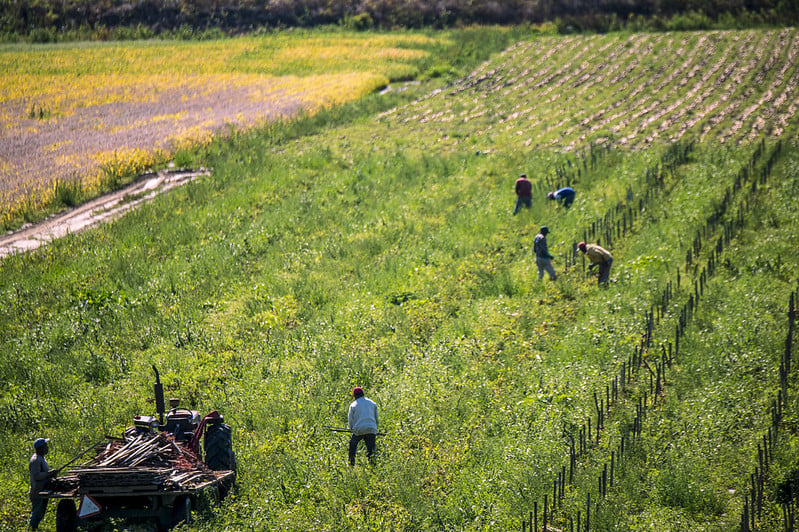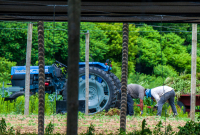Support strong Canadian climate journalism for 2025
Nearly three-quarters of the time, the federal governing body responsible for keeping tabs on employers of migrant workers are giving them a heads up prior to arrival.
In an email to Canada’s National Observer, Employment and Social Development Canada says 70 per cent of inspections conducted by the ministry are announced to the employer prior to inspection, while 30 per cent are unannounced.
Inspections conducted by the ESDC check a variety of factors, including housing and working conditions. They later clarified in an email housing is only one component of these inspections that are announced, and the specific number of inspections for housing on its own is not available.
Inspectors who give advance notice are a problem for migrant workers who may not be living in compliant employer-provided housing, says Anelyse Weiler, assistant professor of sociology at the University of Victoria, who researched housing of migrant workers in B.C. agriculture. During that time, she spoke to migrant workers who gave their first-hand account of inspections while employed through the temporary foreign worker program.
“There are these inspections that are supposed to happen in terms of making sure that employers are following all rules on housing, and to be honest, a lot of those rules and standards are already quite low,” Weiler said.
Between Jan. 1 and Aug. 31, of last year, Immigration, Refugees and Citizenship Canada issued 692,760 work permits through migrant worker program streams. In an email to Canada’s National Observer, the ESDC says it completed 2,122 inspections during the last fiscal year.
During those inspections, non-compliance fines went up 36 per cent from last year, resulting in $2.1 million in penalties compared to $1.54 million in the previous year, and 12 employers being banned from the program.
“What [workers] told us is sometimes employers would be told in advance: ‘Hey, we're coming to inspect your housing,’ and that this would give unscrupulous employers time to essentially stage housing that met requirements,” Weiler said.
When given notice, an employer could, for example, add a washing machine to living quarters in order to pass the inspection, and promptly remove it once it was done, she adds.
For agriculture businesses in B.C., the largest sector hiring migrant workers, pre-season inspections are mandatory before an employer can apply to the federal temporary foreign worker program. These inspections are outsourced by the province to be overseen by industry organizations the B.C. Agriculture Council and the Western Agricultural Labour Initiative.
Other provincial inspections are typically done through government agencies. Ontario, for example, requires employers hiring temporary foreign workers to be compliant through their health authority, Weiler says.
“The agricultural streams of the temporary foreign worker program are really odd in the level of involvement of industry in overseeing labor conditions,” Weiler said. “It's odd to have industry that involved in things that normally we would expect government to do.”
A study out of the University of British Columbia recently found migrant workers in the B.C. Okanagan living in extreme heat conditions beyond what the Western Agricultural Labour Initiative guidelines allow. Pre-season inspections before the hotter months mean summer housing temperatures cannot be verified at the time of inspection, and typically lead to the employer checking a box on their inspection form.
In theory, Weiler says the federal government can do random audits of employers during the season, but in practice, they don’t have the capacity to send public servants all over the country for rigorous inspections of farm worker housing, leaving critical gaps in the system.
The ESDC wrote to Canada’s National Observer that inspections are often triggered by a tip or a complaint, but even those inspections can be either announced or unannounced, and the numbers of each kind of inspection that were provided by ESDC include those prompted by complaints.
In July, 15 Vietnamese temporary foreign workers were removed from a mill site in Port Alberni after complaints were made about the workers living in inhumane living conditions, including lack of running water and rotten trailers.
Hugo Velázquez Vázquez, interim director of family and settlement services at Mosaic — whose team facilitated bringing the workers in Port Alberni to safety — says the tip line receives thousands of complaints, so the government only has the capacity to investigate the most serious cases.
“One of the main concerns of staff and nonprofits is that the worker is seldom made part of the investigation. So they put the tip line, but they don't know how it's going,” Velázquez Vázquez says. “I think there's a disconnect there that everybody's still working on, but it hasn't been solved.”
In B.C., WorkSafeBC has jurisdiction to inspect worksites but not the housing, says Velázquez Vázquez. Contrary to the ESDC, WorkSafeBC inspections are primarily unannounced, a spokesperson wrote in an email to Canada’s National Observer.
A May Senate report recommended that housing inspections for temporary foreign workers be unannounced going forward in order to protect workers from abuse.
Criticism of the program has seemingly sparked a country-wide overhaul of the temporary foreign worker program, created to be “a last and limited resort” which has been under fire for widespread employer abuses. In Quebec, the province announced on Tuesday a six-month freeze of migrant workers coming into the province.






Comments
Shades of federal meat inspectors in the Harper years. It never ends.
Where are the labour unions on this? Their commentary is spotty, suggesting their efforts are weak to overturn this practice. Most union executives would probably say the solution is political, which is true. But union memberships in industries and inside workers are filled with those who enjoy the benefits of unionization but who are working class conservatives.
Union executives and labour lawyers need to build a funded coalition to take on exploitive employers as a matter of ethics, and to force governments to do the right thing. I'd say this effort would demonstrate real leadership, especially when labour economists have some well-designed policies in their back pocket.
Lastly, there are those journos (not of this article) who are political party hacks who prefer criticizing their favourite political target on this topic without exploring the immigration system and potential paths to citizenship for TFWs and migrants. The issue is not about Liberals or Conservatives or the NDP. It's about changing society for the better.